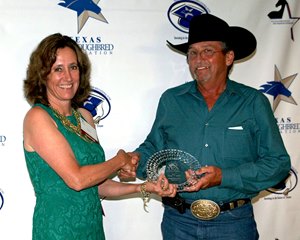Keen Takes Three to Del Mar, Then Leaves Racing


With his last three racehorses settled in at Dan Blacker's stalls at Del Mar this past weekend, Texas-based trainer Dallas Keen has officially retired from the racing game.
Keen, 66, said the wear and tear of traveling, the struggles to find and keep good employees, and the changing regulatory landscape of racing all led to his decision to walk away from a 37-year training career.
"I'm retiring from racing, not from horses," he said. "We still have the farm here and will be helping (his wife) Donna with the Remember Me Racehorse Rescue. We'll do lay-ups at the farm, I may do some horsemen's clinics, and I may pinhook a few horses and stuff like that."
Dallas and Donna Keen own and manage Keen Farms near Burleson, Texas, which is also home to their Remember Me Racehorse Rescue program that they started in 2009. The program is a registered 501(c)(3) charity that is accredited by the Thoroughbred Aftercare Alliance. Since its founding, Remember Me has placed more than 1,000 off-track Thoroughbreds in new homes.
"We work at it real hard to make sure these horses find a new home. Donna is really good at placing a horse with someone who fits it. It is like an adoption," he said.
The farm has an obstacle course used to train horses for mounted police and patrol programs in and around Arlington, Grand Prairie, Fort Worth, and Burleson.
Keen made his last start July 4 at Lone Star Park, where the track named a 1 1/16-mile maiden special weight on the turf in his honor. He had a horse in the race, a 3-year-old Epona Thoroughbreds homebred gelding named Mr. Valentino who had never been two turns and never raced on the grass. Jockey Sofia Barandela kept the gelding close to the pace and then turned him loose after six furlongs to win by 1 1/4 lengths.
"That was a good way to go out. Otherwise, I would have had to be in someone else's win photo," Keen said.
Born in Sterling, Colo., Keen is the son of retired jockey and trainer Elmer "Corky" Keen, who operated Keenland Acres near Fort Collins until 1979, when he relocated to Texas. Both father and son bought farms in Texas, and Dallas Keen said he had expected to spend his professional life on the farm breaking and conditioning young horses. An owner would urge him to get a trainer's license, which he did, and he started his first racehorse at Louisiana Downs May 24, 1986. At the time, Texas was still a year away from legalizing pari-mutuel waging and eight years away from Sam Houston Race Park opening as the state's first Class 1 racetrack in 1994.
Shipping off the farm to Louisiana Downs worked well for Keen while Texas got its racing program up and running. He got his first winner at the Bossier City, La., track July 27, 1986, with Pulido and later his first black-type winner with Off Hand in the 1989 Stardust Stakes, and his first graded stakes winner in the 1992 Ark-La-Tex Handicap (G3) with Inevitable Hour, according to Equineline.com records.
Lone Star Park opened for racing in 1997, and Keen became the leading trainer there in 1997-98. Along the way, he campaigned several good stakes horses, including multiple stakes winner Valhol, who won the 2003 Maxxam Gold Cup at Sam Houston Race Park, 2002 Whirlaway Handicap at Fair Grounds Race Course & Slots, and two other stakes in 2001. He also campaigned 2000 New Orleans Handicap (G3) winner Allen's Oop, who won the Gold Cup as well.
Valhol is also remembered for the race he had taken away. The son of Diazo was first across the line in the 1999 Arkansas Derby (G2) at 30-1 but was later disqualified when video showed that jockey Billy Patin had carried an electrical device. Valhol was placed last and forfeited the $300,000 winner's share of the purse. Keen was not accused of any wrongdoing or having prior knowledge of Patin's scheme.

Keen retired with 970 wins and $15,951,879 in total purses won. He saddled horses in the paddocks of 51 racetracks throughout the United States, including at nine tracks that have since closed—and Golden Gate Fields is about to make it 10.
"I've raced everywhere and chased purses, going to where my horses could be competitive and could make some money," he recalled. "Now, it's just different."
Keen said he's not a fan of what he's seen from the Horseracing Integrity and Safety Authority, the national regulatory program that launched a year ago.
"I think the government has gotten way too involved, and we're missing the horsemanship in the decisions," he said. "A lot of the decisions they've made are not good for the horse. You wouldn't treat a human athlete the way they want us to treat our racehorses, and they're athletes.
"I really like working with the off-track Thoroughbreds and teaching them to do a lot of neat stuff. It is amazing how quickly they adapt to their second careers; it's so rewarding."
